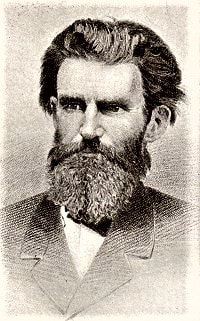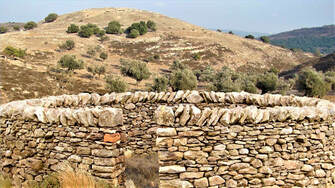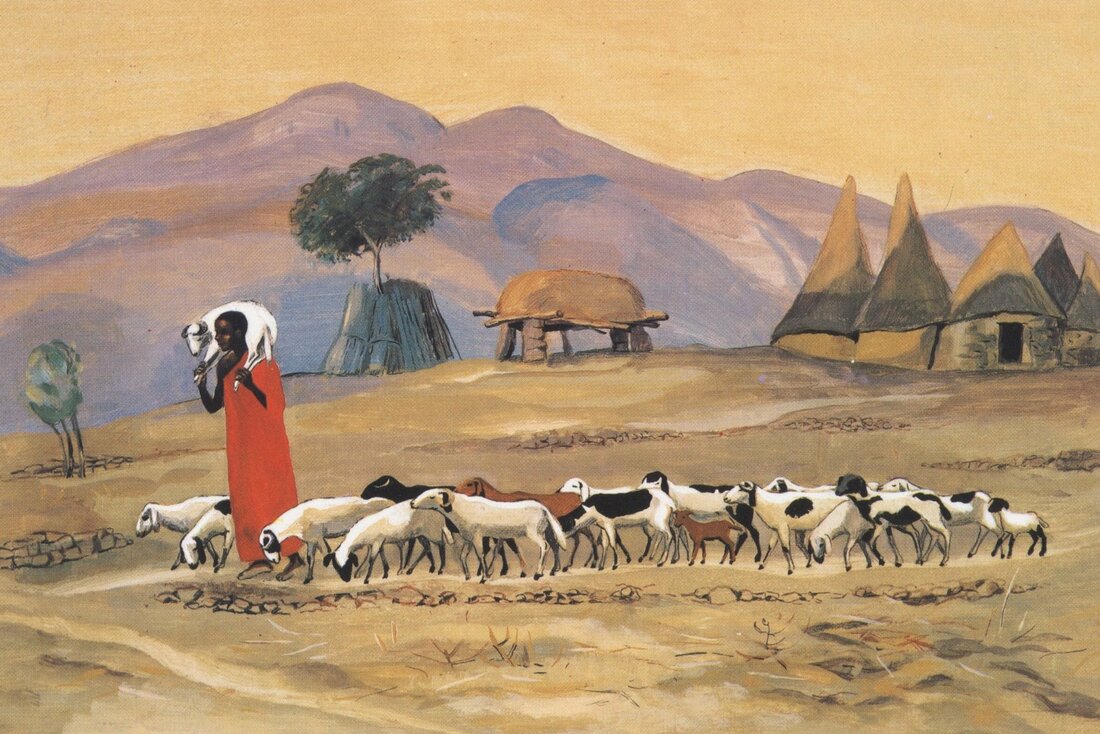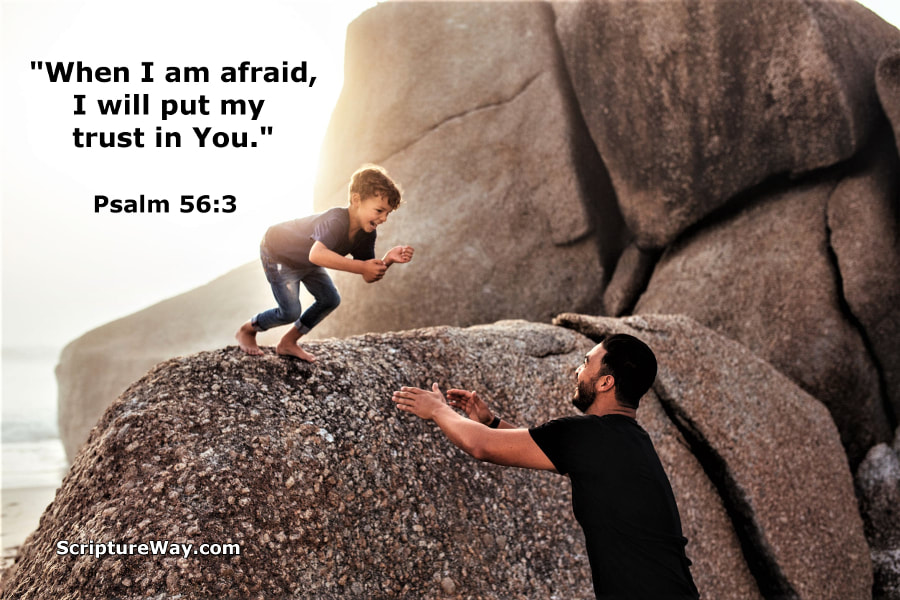"The Lord is my shepherd; I shall not want. He makes me lie down in green pastures. He leads me beside still waters. He restores my soul. He leads me in paths of righteousness for his name's sake." (Psalm 23:1-3) "I am the good shepherd." (John 10:11, 14) This article describes the author background and then the scripture allusions for verse 1 of the hymn, "Savior, Like a Shepherd Lead Us." This article is the first in a series on this theologically-rich children's hymn. Reference 2 describes the scripture allusions in verse 2 of "Savior, Like a Shepherd Lead Us." Hymn Text Author Researchers do not know for sure the circumstances about how the text for "Savior, Like a Shepherd Lead Us" was written; however, researchers attribute this beloved hymn of the Christian faith to Englishwoman Dorothy Ann Thrupp (1779-1847) (Ref. 3, Ref. 4). Miss Thrupp is "particularly remembered as a writer of hymns for children" (Ref. 4). "Savior, Like a Shepherd Lead Us" first appeared unsigned (unattributed) in her collection, Hymns for the Young, in 1836 (Ref. 4). Ms. Thrupp wrote this hymn for teaching young children the message of a "caring Christ who loves all his children" (Ref. 3).  William B. Bradbury (Ref. 6) William B. Bradbury (Ref. 6) Hymn Tune Composer William Batchelder Bradbury (1816-1868) was an American musician who composed the tune in 1859 most often associated with "Savior, Like a Shepherd Lead Us" (Ref. 3, Ref. 5 below, Ref. 6). He named the tune "Bradbury" after himself (Ref. 3, Ref. 5). Mr. Bradbury "modified the original words meant for children and broadened the meaning to include all the congregation" (Ref. 3). Mr. Bradbury also composed the tunes to many popular hymns including "Jesus Loves Me," "He Leadeth Me," and "My Hope is Built" (Ref. 6). In addition to being an excellent musician and composer, Mr. Bradbury served as a music educator, choir leader, organist, and was a devoted reader of the Bible (Ref. 7, Ref. 8). All of the Bible verses below are linked to the BibleGateway.com website (Ref. 9). The verses below are quoted from the English Standard Version (ESV) unless noted otherwise. To see the lyric sheet for all four verses of "Savior, Like a Shepherd Lead Us" on one page, click here. The lyrics are provided by Timeless Truths (Ref. 10). Scripture Allusions - Verse 1 The first verse of this great hymn teaches children that Christ is our great Shepherd who leads us, cares for us, feeds us, and protects us. The verse also explains that Christ has redeemed us and that we are his possession. "Savior, like a shepherd lead us, much we need Thy tender care" The Lord is our Shepherd who leads us and cares for us. Psalm 23:1-3 -- "The Lord is my shepherd; I shall not want. (2) He makes me lie down in green pastures. He leads me beside still waters. (3) He restores my soul. He leads me in paths of righteousness for his name's sake." Psalm 23:5 -- "You prepare a table before me in the presence of my enemies; you anoint my head with oil; my cup overflows." Isaiah 40:11 (KJV) -- "He shall feed his flock like a shepherd: he shall gather the lambs with his arm, and carry them in his bosom, and shall gently lead those that are with young." John 10:11 -- "I am the good shepherd." (also John 10:14) "In Thy pleasant pastures feed us, for our use Thy folds prepare." The Lord feeds us in pleasant pastures and protects us. Ezekiel 34:14 (KJV) -- "I will feed them in a good pasture, and upon the high mountains of Israel shall their fold be: there shall they lie in a good fold, and in a fat pasture shall they feed upon the mountains of Israel."  Permanent Sheepfold Enclosure - Holy Land. Photo Copyright David Padfield. Used under license. Photo source: FreeBibleImages.org. Permanent Sheepfold Enclosure - Holy Land. Photo Copyright David Padfield. Used under license. Photo source: FreeBibleImages.org. A fold was a walled in, hedged, or fenced place for keeping and protecting sheep or other livestock (Ref. 11, Numbers 32:24 KJV). Jesus referred to such a sheepfold in John 10:1 (KJV). "Truly, truly, I say to you, he who does not enter the sheepfold by the door but climbs in by another way, that man is a thief and a robber." Jesus not only is the means of access to the fold; he also is the Shepherd who protects the sheep in the fold with his own body at the door. "I am the door. If anyone enters by me, he will be saved and will go in and out and find pasture" (John 10:9, Ref. 12). "Blessed Jesus, blessed Jesus! Thou hast bought us, Thine we are." (Phrase repeated) The phrase, "Thou hast bought us, Thine we are," explains to children the meaning of redemption. HELPS Word-studies defines redeem as "to release (set free) by paying the full ransom"; (figuratively) to restore "something back, into the possession of its rightful owner" (Ref. 13). Christ has purchased us and now we are his possession. Titus 2:13-14 (italics added) -- " ... waiting for our blessed hope, the appearing of the glory of our great God and Savior Jesus Christ, who gave himself for us to redeem us from all lawlessness and to purify for himself a people for his own possession who are zealous for good works." 1 Peter 1:18-19 (KJV) -- "Forasmuch as ye know that ye were not redeemed with corruptible things, as silver and gold, from your vain conversation received by tradition from your fathers; But with the precious blood of Christ, as of a lamb without blemish and without spot." Listen and Sing Along Click on this YouTube link - Solo piano meditation on the hymn "Savior, like a Shepherd Lead Us" with sing-along lyrics. Recorded by Rick Betts - March, 2011. Prayer Thank you, Jesus, for being my Savior and Shepherd. Thank you for leading me and for all the ways that you care for me. References
1. http://diglib.library.vanderbilt.edu/act-imagelink.pl?RC=48288 2. http://www.scriptureway.com/home/savior-like-a-shepherd-lead-us-scripture-allusions-verse-2 3. https://www.umcdiscipleship.org/resources/history-of-hymns-savior-like-a-shepherd-lead-us 4. https://en.wikipedia.org/wiki/Dorothy_Ann_Thrupp 5. The United Methodist Hymnal, The United Methodist Publishing House, 1989 6. https://en.wikipedia.org/wiki/William_Batchelder_Bradbury 7. https://www.wholesomewords.org/biography/bbradbury.html 8. http://www.hymntime.com/tch/bio/b/r/a/d/bradbury_wb.htm 9. https://www.biblegateway.com/ 10. Reference 10 begins next line https://library.timelesstruths.org/music/Savior_Like_a_Shepherd_Lead_Us/ 11. https://www.biblegateway.com/resources/encyclopedia-of-the-bible/Fold 12. http://www.ScriptureWay.com/home/jesus-is-the-door 13. https://biblehub.com/greek/3084.htm
2 Comments
"When I am afraid, I will put my trust in You. In God, whose word I praise, In God I have put my trust; I shall not be afraid. What can mere man do to me?" (Psalm 56:3-4)
"Trust and confidence in the Lord is the best antidote against fears" -- John Gill (1697-1771) (Ref. 1, Ref. 2).
Consider. On a scale from 1 to 10, with 10 being the highest, how would you rate yourself for trusting in God when you are afraid?
Biblical Background
David wrote Psalm 56 during one of the lowest points in his life. Saul, the king of Israel, was determined to kill David (1 Samuel 20:30-33). Even though Jonathan, Saul's son, and David were close friends, Jonathan advised David to flee from Saul (1 Samuel 20:41-42). David came to Nob to Ahimelech, the priest (1 Samuel 21:1). David lied to Ahimelech about the purpose of his visit (1 Samuel 21:2). David received from Ahimelech consecrated bread and the sword of Goliath (1 Samuel 21:6, 1 Samuel 21:9). David arose and "fled that day from Saul" to Achish king of Gath, a city in Philistine territory (1 Samuel 21:10, Ref. 3).
Gath was the home town of Goliath (1 Samuel 17:4). David had killed Goliath in battle (1 Samuel 17:41-49). David now had the sword of Goliath with him. The servants of Achish knew of David's reputation. "Is this not David the king of the land? Did they not sing of this one as they danced, saying, 'Saul has slain his thousands, And David his ten thousands'?" (1 Samuel 21:11). The scripture says "David took these words to heart and greatly feared Achish king of Gath" (1 Samuel 21:12). David then "disguised his sanity before them, and acted insanely" (1 Samuel 21:13). When I Am Afraid, I Will Put My Trust in You
Despite David's fear and troubled emotional state, David makes an astounding declaration about trusting in God when he was afraid. "When I am afraid, I will put my trust in You. In God, whose word I praise, In God I have put my trust; I shall not be afraid. What can mere man do to me?" (Psalm 56:3-4). David repeats his declaration of trust in Psalm 56:11, "In God I have put my trust, I shall not be afraid." Note the subtle change in tense from "I will put my trust" in verse 3 to "I have put my trust" in verse 11.
In the Hebrew, the word for "trust" means to be boldly confident, secure, and sure (Strong's Exhaustive Concordance - Ref. 4). When we trust in God, we are boldly confident, secure, and sure in him. David frequently wrote in the Psalms about trusting in God. For additional encouragement and strength on this topic, I suggest you read "29 Bible Verses About Trusting God" (Ref. 5). David recognized that the remedy -- the antidote -- for fear is to trust in God. David put his confidence in God and in God's care. Will you do the same? A related, closing verse for your consideration: "Do not fear, for I am with you; Do not be afraid, for I am your God. I will strengthen you, I will also help you, I will also uphold you with My righteous right hand." (Isaiah 41:10)
Apply. If you are fearful or afraid today, pray to God. Put your complete trust in God and the promises in his word (Psalm 56:3-4). God will strengthen you and help you (Isaiah 41:10). Thank God for his work in you to deliver you from your fear and for taking care of your concerns.
Suggested Listening. Listen to Alan Jackson's Official Music Video, "'Tis So Sweet to Trust in Jesus (Live)."
Related Lessons and Resources
"29 Bible Verses About Trusting God" - Psalm 56:3 "The Remedy for a Troubled Heart (John 14:1)" "'Fear Nots' of the Old Testament" - Isaiah 41:10 |
Daily Bible Verse(Click the link above) AuthorMr. Whitney V. Myers. Christian. For more information, please visit the Author Page. Posting ScheduleI plan to provide new postings about once a month. Planned Topics(subject to change) Recent Posts(most recent three months) Popular Posts(top 10) Categories
All
Archives
July 2024
|
|
Copyright 2018-2024 Whitney V. Myers |
Listed in Feedspot's Top 100 Bible Study Blogs and Websites |


 RSS Feed
RSS Feed
